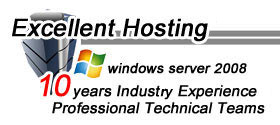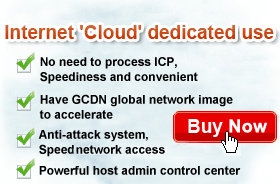The Myths and Facts About Cloud Servers
-
Release time:2013-10-11

Browse:3925
-
Other People Are Reading
 The best Cloud apps for your small business
The best Cloud apps for your small business 
There is a lot of hype and confusion around the word “cloud” these days. In the last two years, the word “cloud” has been thrown around anywhere you go, no matter what type of technology you encounter.
Cloud can be explained in many different ways, but generally speaking, “cloud” means that you are hosting your data on the Internet.
For example, let’s say you previously had a few servers at your company located in a closet or small server room within your office. These servers would not be categorized as cloud, as they are within your network and not hosted over the Internet. However, if you took those servers and migrated them to virtual servers on the Internet, within a secure data center, you could then categorize those servers as “cloud servers.”Cloud servers are very powerful virtual environments created within a very strong cluster of servers. Cloud servers carry many benefits that are not offered within a dedicated server. Before we get into the details, let’s compare the difference between a dedicated server and a cloud server.
As described above, a cloud server is a virtual instance or virtual machine created within a powerful cluster of servers. So in this case, you’re sharing computing power with other cloud servers. But make no mistake; a properly configured cloud has tons of resources and power available, so running out of resources is usually not an issue.
A dedicated server, means you have a dedicated machine allocated just for you, hosted at a secure data center o r in an area at your facility.
Eranet Link
Why Choose Us
VPS dedicated hosting advantages:
- Based on INTEL VT technologic virtual monitor improve performance of server more easily.
- Use cloud-calculation service, high speed data access and smart switch.
- Oracle VM VirtualBox, a powerful x86 virtual hosting software.
- Support 64-bit system,Use large capacity memory in order to increase efficiency.
- Unique KVM ability, self-help online installation operating system and troubleshooting.
Benefits of Cloud Servers
Flexibility & Scalability – Cloud servers offer substantial flexibility and scalability. This means that if you need more resources, you can simply login to your automated control panel (usually setup by your web host) and easily scale resources without the need of any downtime. On a dedicated server, you would have to make sure your server is even upgradable for more resources, and then you would have to schedule downtime and do the upgrade. On a cloud server, the upgrade is instant, and the addition of 4GB of RAM can be done within minutes.
Reliability – Reliability on a cloud server is much higher than on a dedicated server. The reason for this has to do with the fact that dedicated servers will often times have hardware failures. In case of a hardware failure on a dedicated server, the server would be taken off of the server rack, and the parts would have to be replaced. If the parts are not available right away by the server provider, this can cause hours of downtime. On a cloud server, if there were a hardware failure, immediately other servers would compensate for the resource loss and hardware failure and more resources would be allocated to the cloud server immediately— without the need for any downtime. This is because cloud servers are setup on the cloud and have a cluster of servers at their disposal.
Easy Setup – Dedicated servers take more time to setup than cloud servers. Since a dedicated server has to be manually setup and brought online, it can take a few hours to get one started. However, since the cloud server is a virtual machine, it can be provisioned within minutes.
Cost-Effectiveness – There is a major cost benefit to moving your servers into the cloud. Cloud servers are not only cheaper, but for the same price of a dedicated server, you can get almost five times more CPU power. The reason for this is that technology has come a long way in the last few years, and computing power is no longer what it used to be. It’s a lot more powerful. The CPU resources allocated on a cloud server have much more strength than what is available on a dedicated server. Dedicated server performances are just not comparable to the performance of a cloud server.
Myths and Facts About Cloud Servers
Myth: Cloud is a fad.
Fact: Cloud as a term is new, but the concept of cloud computing has been around since the late nighties. The Internet itself technically means cloud computing. Cloud computing is here to stay. Gartner Research predicts that by 2014, more than 80% of Fortune 1000 companies will be paying for some form of cloud computing.Myth: The Cloud is not secure.
Fact: If the cloud provider is using low-end cloud computing software, some clouds may not be as secure as other clouds. A public cloud is multi-tenant being, meaning it’s on the same network as other users. This can make a cloud less secure if there are abusers on the network. It all comes down to whom you host your cloud with. So far to date, security in the cloud has been great, even on very large cloud environments. The technology available today has allowed cloud computing to be more and more secure everyday.Myth: The cloud is too complex.
Fact: Cloud Servers are not any more complex than a dedicated server o r VPS. In fact, cloud servers are easier to setup than dedicated servers, you can provision a cloud server instantly via an online control panel or portal: The portal does all the work and once your cloud server is setup you will receive your account information.Myth: I will have to re-write my code in order to use cloud hosting.
Fact: Some cloud hosting providers have built complicated platforms that require you to build or alter your code in order to properly function on the cloud. Our cloud is built just like a dedicated server, allowing you to upload your code and website as easily as you would upload it on any other hosting service.
Search


 China Yuan RMB
China Yuan RMB U.S. Dollar
U.S. Dollar Euro
Euro British Pound
British Pound Canadian Dollars
Canadian Dollars Australian Dollars
Australian Dollars Hong Kong Dollars
Hong Kong Dollars Vietnamese Dong
Vietnamese Dong More Info
More Info 










